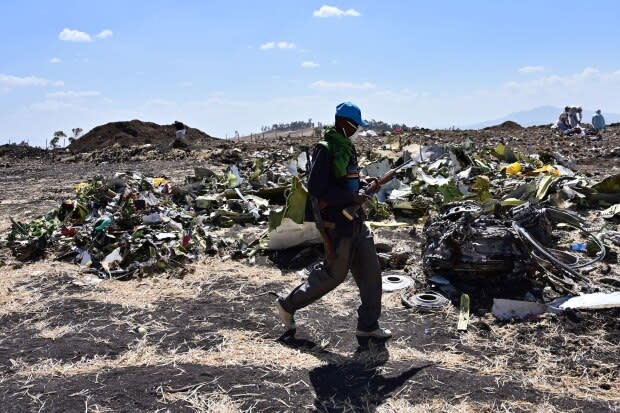Canada to conduct flight tests on grounded Boeing 737 Max fleet
The country's top aviation officials said Canada will conduct its own flight tests to examine if the grounded Boeing 737 Max fleet is safe to fly after two deadly crashes.
For decades, countries around the world have relied on the United States to take the lead and certify Boeing aircraft, as they are manufactured there. Other countries then validate that work. But Transport Canada says it is putting in place additional measures to give Canada more independence in scrutinizing the 737 Max fleet.
"We've grown the amount of involvement we have," said Nicholas Robinson, Canada's director general of civil aviation, on Tuesday to a House of Commons committee that's studying the issue.
The changes come in the wake of criticism by victims' family members that Canada's certification process relies too heavily on the U.S., and amid concerns the U.S. Federal Aviation Administration delegates much of the work to manufacturers, such as Boeing. Public hearings in the U.S. revealed Boeing ignored and covered up warnings and issues with the aircraft.
Still, Canadian officials admit Canada will need to largely rely on the information provided by the U.S. because it would take too much time and resources to do all of the work here.
"We don't have to throw the process out that we have right now," said David Turnbull, Canada's director of national aircraft certification. "It is scalable. Think of it like a volume button, when things happen like this we can turn the volume up, we can increase our involvement."
Transport Canada is currently working with regulators around the world to decide whether or not it will permit the Max to fly again.
In Oct. 2018, a Lion Air plane plunged into the Java Sea after takeoff in Indonesia, killing all 189 people on board. In March 2019, an Ethiopian Airlines flight nosedived into the ground killing all 157 people onboard including 18 Canadians and at least three permanent residents of Canada. Satellite data showed both planes experienced significant flight control problems.

Countries around the world swiftly grounded the Maxes. Canada's Minister of Transport came under fire for being one of the last countries to ban the fleet from the sky.
Bloc Québécois MP Xavier Barsalou-Duval told the two government officials yesterday that travellers are afraid of the Maxes and asked how Canada was going to tighten its surveillance of the recertification process.
Robinson said Transport Canada has already asked for additional information from the FAA.
The federal government is also meeting on a weekly basis with the three Canadian airlines that fly that fleet— Air Canada, WestJet and Sunwing — to let them know about the work its doing to recertify the planes, officials said. Airline associations are also being regularly briefed.
Independent tests 'a start'
When asked why Canada doesn't independently certify all planes, officials said if each country did that for every aircraft in the system there wouldn't be enough planes accessible. For example, when Canada certified Bombardier's Airbus 220 it took years and more than 150,000 hours of work.
Chris Moore's 24-year-old daughter, Danielle, died in the Ethiopian Airlines crash. He called the move to conduct independent flight tests "a start."
"They should have done this after the first crash," said Moore. "It's too little too late in terms of saving my daughter. It's cold comfort but it's good to know they're on the right track making sure the skies are safe."

